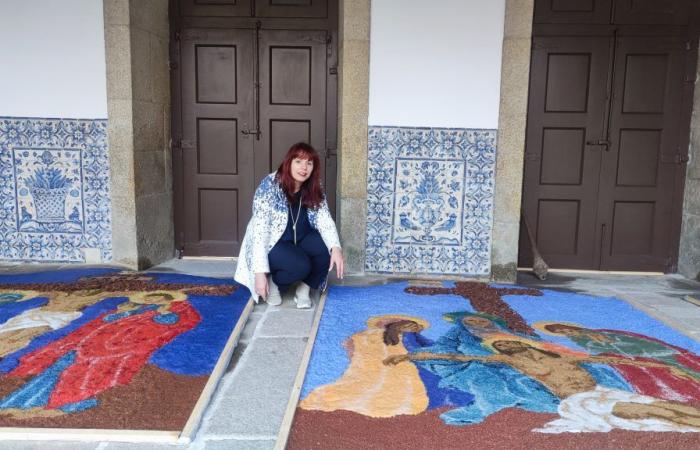
Daily
On the eve of Holy Week and on the cusp of a new Easter Sunday, the Cathedral of Viseu hosts a Stations of the Cross that promises to leave no one indifferent. Harsh reports, real stories and life testimonies that promise to bring today’s times closer to Jesus Christ’s journey to Calvary. The director of the Cultural Assets department of the Diocese of Viseu has no doubts: this moment will allow us to reflect and live in silence. Fátima Eusébio applauds the work of those who helped make the Stations of the Cross possible, praises young people and the role they play in the Church and calls on everyone, Catholics and non-Catholics, to be more welcoming and less critical
It’s time to give time to silence. Around Easter, cultural and religious initiatives multiply. And Viseu is the stage this Saturday, March 23, for a Stations of the Cross that takes place in the upper cloister of the Cathedral. “We want to show that the journey taken by Christ continues to be lived today by many who suffer. We all have our Crosses: heavier, lighter. The meditations will serve as a point of reflection for those who will listen to them. Through them, we will be invited to think about whether we are prioritizing what is important, given what we have seen around the world”, points out Fátima Eusébio, director of the Cultural Assets department of the Diocese of Viseu. Ultimately, she says, the Stations of the Cross will serve to “uninstall us, to question ourselves”.
In an analysis of what she sees around her, Fátima Eusébio admits that she feels that “Christ continues to suffer and be crucified when we witness wars, atrocities that people continue to commit”. For the director of the National Secretariat for Cultural Assets of the Church, there is another ordeal. A destiny that she maintains today takes the form of a computer screen or cell phone. “Social media crucifies so many people. By issuing opinions without knowing the context of events… Criticizing for the sake of criticizing. It’s good that there is an opportunity for us to follow these different crosses and reflect on them”, she argues.
14 personalities, 14 testimonies, 14 ways of looking at the world
It was the entity that manages the assets of the diocese of Viseu who thought up this initiative. And at the base is the need to make the biblical message of the passion and death of Jesus Christ more real. Therefore, Fátima Eusébio chose 14 personalities who meditated on each of the stations of the cross. “We thought of a station of the cross meditated and sung in a special way. On the one hand, we will read the biblical passages corresponding to each of the stations, but each of the stations will have a meditation. This moment will affect people from our society. We sought to select personalities with different professional backgrounds and experiences. Starting from the station that we assign to him, the person will reflect and meditate on it. In light of what your life is. It will be a personal reflection”, highlights Fátima Eusébio.
As if it were a picture of life, each of the guests will try to bring memories, experiences and, above all, their truth, relating them to the station of the cross. “We will have the reflection of a person linked to politics, who will be the councilor for Culture at the Viseu Chamber, Leonor Barata, a priest, a police officer, a mother who lost a daughter at a very young age, a teacher, a doctor, a young man who participated in the World Youth Days, a representative of prison ministry, a person who recovered from a period in which he was very ill, someone who resigned from a position, a prisoner who will have the meditation read by someone else, a family in mourning, an artist… They are involved from different quarters”, says the person responsible for cultural assets of the Viseense diocese.
Fátima Eusébio, who is receiving the latest testimonies at this time, guarantees that “there are texts that will force you to reflect”. “They are deeply moving. It is good that whoever goes to the Stations of the Cross hears and feels these words”, he appeals. “These are people with very different faith records. We looked for that diversity: to show how people who are living in very different contexts look at each of these paintings”, she adds. Between the reflections there will be time to listen to the feeding of souls, by a group from the Campo de Madalena Parish.
Young people have to feel that they are needed, argues Fátima Eusébio
The cloisters of Viseu Cathedral are filled these days with paintings alluding to the stations of the cross. Paintings designed in that parish of the Viseense diocese. The objective was to remember one of the arts that in several parishes from north to south of the country are performed at least once a year: flower carpets. “I consider it a tradition that is important to preserve and value”, he argues. “We thought about taking this art to another level and making the panels with the Stations of the Cross in a more durable material. We started by using colored sawdust. Unfortunately, some panels were damaged because there were very windy days. Therefore, we had to adapt and replace a large part of the colored sawdust with colored salt. It has a different consistency and weight and has, fortunately, been maintained”, emphasizes Fátima Eusébio.
And so it was. In an intergenerational gathering, young and less young people came together for several hours a day to draw, design and fill in each of the 14 pictures of the Stations of the Cross. The panels are three meters long and two meters wide. “There was a permanent team of four or five people, but more young people joined. We worked until six in the morning… These are tiring jobs: we are working on the floor and they require detail. But the end result is very gratifying”, highlights Fátima Eusébio.
A committed Catholic and a woman of faith, she has long been confident in the work of the new generations.
And 2023 was, he confesses, a year to remember. “The best proof that young people, when they are captivated and involved, are there, was World Youth Day. Some of the young people who were there don’t even go to Church very often, but they said yes. A very present yes. Not just the young people who participated in the Days, but also those who were involved in the preparation”, she explains.
Fátima Eusébio understands that “it is important to involve young people and show them that these traditions concern them and that we count on their participation”. “Of course, nowadays, they are asked for many things. As we adults are too. We run the risk of becoming scattered and not experiencing some things as we would like. It was good to see the presence of young people. Realizing that they had chosen to do those paintings with us and seeing that they were happy with the final result”, she explains.
Silence will prevail this Saturday in the cloister of the Cathedral of Viseu
By way of invitation, the director of the Department of Cultural Assets of the Diocese, emphasizes that this Saturday night “will invite silence and reflection”. “Whether people are Catholic or not, it is a moment that will live with a light that emerges during this night”, she stresses. Silence that, Fátima Eusébio understands, is not always found these days. “Often we don’t allow ourselves to be silent. We no longer seem to have time to free our minds. We forget to be with ourselves. And Lent invites us to reflect on our experience and how we can overcome what is less good and become better people. To welcome and love others. It’s a universal language,” she explains.
The next week, known in the Catholic Church as “holy week” or “major week” will end on Easter Sunday, March 31st. “That date makes me miss it. I remember my childhood days, in my parents’ village. The Easter visit was a celebration. It was joy. Easter is also family. It’s receiving. When we are with love, we are with Christ. It’s the true expression of love,” he clarifies. And about traditions that she cannot do without, Fátima Eusébio is peremptory: the olive oil cake. “My grandmother kneaded in wooden kneaders. My mother keeps making it. I really like an olive oil cake, without it being sweet. And some good cavacas”, she details.





